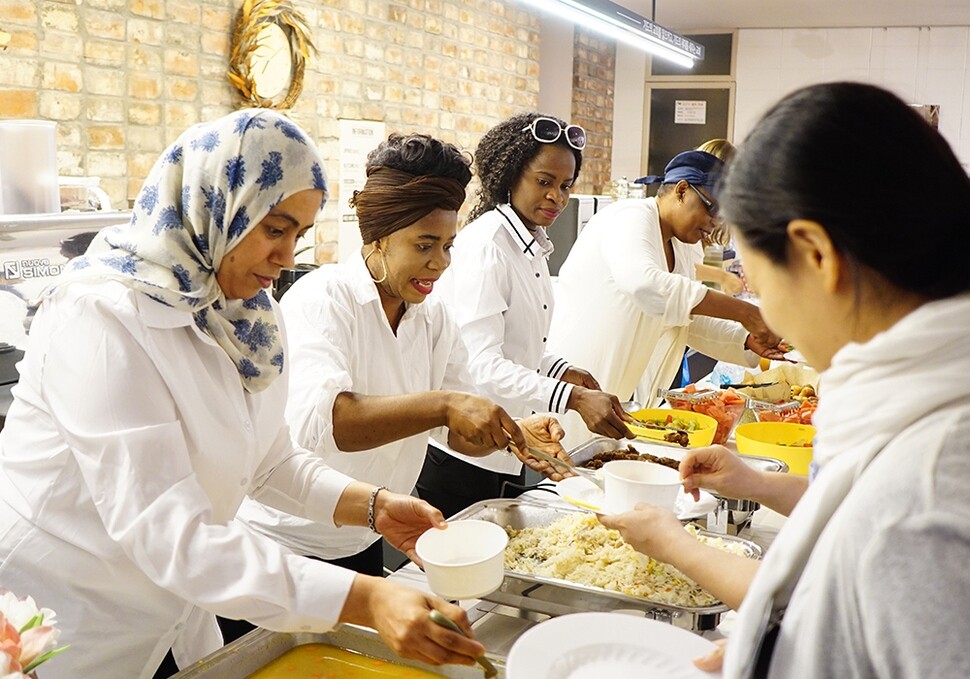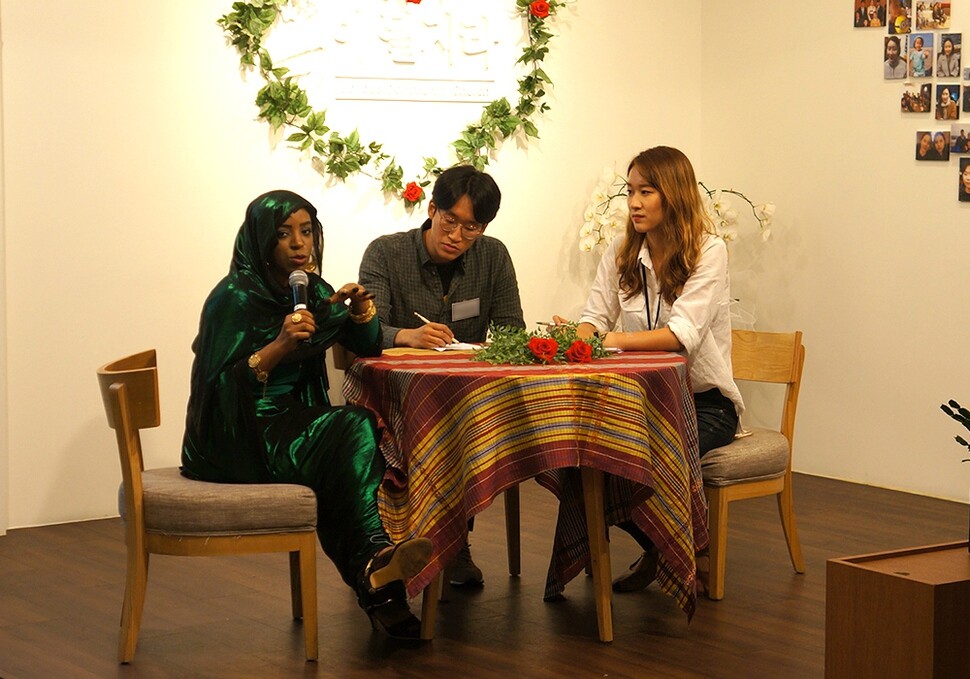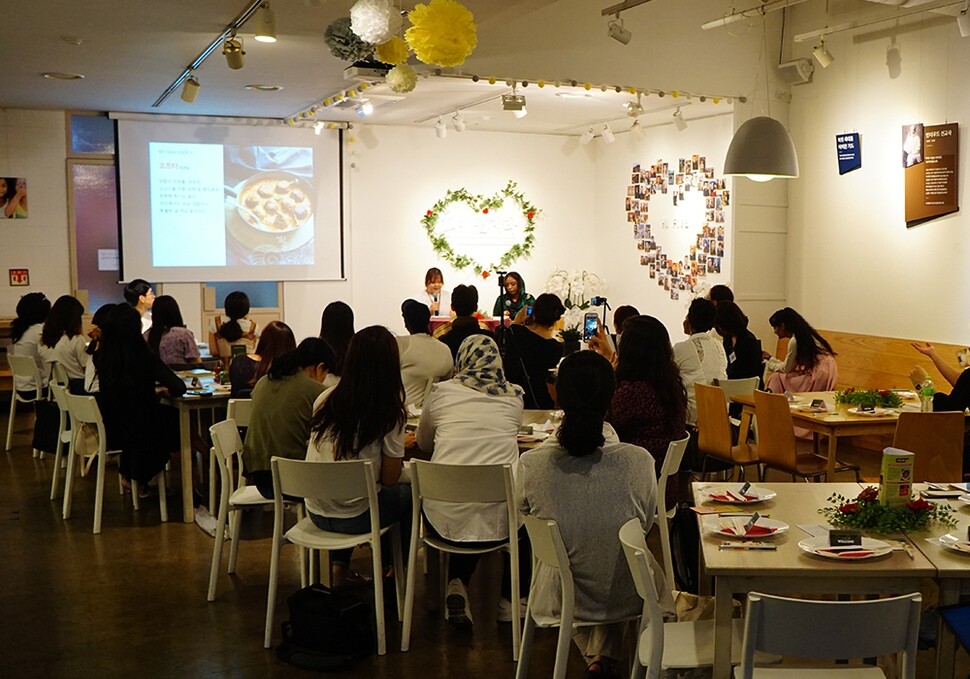hankyoreh
Links to other country sites 다른 나라 사이트 링크
Local community of refugee women gathers and cooks for each other

Mix minced halal-slaughtered beef with breadcrumbs, spices, and diced vegetables and round into a ball. Cook until the exterior is golden brown and serve with sweet and spicy sauce.
This is the recipe for kofta, a Middle Eastern beef meatball dish. Kofta was one of the dishes in a Sudanese home-style meal prepared off of one side of a cafe in Seoul’s Hannam neighborhood at 7 pm on June 26. The 40 or so people who had come through the pouring rain to visit the cafe slowly began to sample the Sudanese food on their plates, their eyes aglow with curiosity.
“In Sudan, we make kofta when a special guest arrives or there’s a special day, like a birthday. That means everyone here is special.” As 27-year-old Mazzah finished her explanation, the “special guests” responded with cheers and applause. Dressed in a shiny green hijab, Mazzah smiled all the while as she talked about the dishes she had prepared.

A Sudanese woman with official refugee status in South Korea, Mazzah was taking the stage for a “Nomad Dinner Table” event organized that day by Refuge PNAN, an international refugee assistance group. The third of the monthly event since they started in April, the dinner was an opportunity for female refugees from around the world to prepare home-cooked dishes reflecting their own stories. It was organized with support from the UN Refugee Agency and other sources to encourage interaction between local residents and refugee women. In addition to the kofta, Mazzah’s story was also reflected in other dishes served at the Nomad Dinner Table that day including baobab juice, lentil chicken soup, zalabia (Arabian-style fritters).
A father’s love and lentil chicken soup
As she told the attendees about her “soul food” – the lentil chicken soup – Mazzah shared a special memory of her father. He was a politician in Sudan who traveled to Egypt and different European countries to escape oppression from political forces; he finally settled in Saudi Arabia, where Mazzah and her four younger siblings were born.
“My father was a wonderful man with a lot of love for his family, but life in Saudi Arabia was not easy because of the extreme racism there,” she explained.
In 1999, Mazzah’s mother was hospitalized following a bad traffic accident. Then eight years old, Mazzah was summoned to the kitchen by her father, who taught her the recipe for lentil soup for the first time.
“To be honest, the first soup I tried making that day tasted awful, but my father ate all of it and said it was delicious. Can’t you just sense that father’s pride in his young daughter? For me, this is soul food that makes me remember my father’s love and encouragement.”
The year she turned 14, Mazzah returned to Sudan with her mother and younger siblings to get the higher education she was unable to receive in Saudi Arabia. Entering university in 2008 as a medical engineering student, Mazzah met her future husband Yessein [sp?], now 36.
“In 2009, the year I first met Yessein, there were a lot of demonstrations by university students craving democracy. Yessein had also suffered persecution by the Arab government just because his family was African Sudanese.”
According to Mazzah, zalabia is the dish that reminds her of her romance with Yessein, whom she said she fell in love with because he “was like my father” in his political activities to protect the rights of the underprivileged.
“Zalabia are Sudanese street food doughnuts,” she explained. “I used to eat them with Yessein in our university days, and I still remember the sweetness of those days whenever I see them.”
A rare case in “refugee family union system”
In 2012, Yessein traveled to South Korea to escape political persecution. He applied for refugee status, and a year later he was able to get back in touch with Mazzah via Facebook.
“We were exchanging messages online, and in 2016 Yessein proposed to me. We had our wedding in Egypt the following year, in 2017, and in November of that year we went back to live together in South Korea,” she recalled.
Mazzah was able to come to South Korea through the “refugee family reunion system,” which gives refugee status to spouses and underage children of people with refugee status according to the Refugee Act. She was fortunate in that Yessein’s refugee status had been recognized – but the decision to come to South Korea was a tough one, she said.
“It wasn’t easy making the choice to leave my family and live as a refugee in an unfamiliar place. When refugees leave their home countries, their family members are often held hostage or killed. But my love for Yessein was greater than my fear.”
Yessein has settled in Gyeonggi Province, where he supports his family working at a factory. Mazzah stressed that she too “would like to be someone who helps society.”
“To begin with, I’m working hard to learn Korean, and I would like to continue studying medical engineering, which was my major in Sudan, so I can be economically self-sufficient,” she said. “My dream is to be a good member of South Korean society who uses my abilities to help others.”
As Mazzah finished her presentation, applause rang out from the attendees. In response to impromptu song requests, Mazzah had the attendees stand up and dance along to cheerful music.
“Soul food from unknown destinations,” “Home cooking with a story” – the PNAN staff deliberately avoided using the word “refugee” in promoting the Nomad Dinner Table event. Their hope was that once the refugee frame was taken out of the equation, people would be able to see the refugees’ true faces and coexist with them as people.

Shin Seung-yeon, a 25-year-old company employee, said she was unaware of the refugee theme when she came to the event after seeing it advertised on the meeting culture platform On Off Mix.
“I think I definitely had my own preconceptions about refugees after seeing the negative portrayals of them in the media,” Shin admitted.
“It really shattered my preconceptions about refugees to actually meet them and see them talking about how they want to be good members of South Korean society,” she added.
PNAN secretary Kim Ji-eun, who planned the event, said it was “definitely difficult for refugees to share their experiences naturally in different cultural spheres.”
“Food is a medium that allows refugees to share their own honest stories, while the people listening can rid themselves of the vague fears triggered by the word ‘refugee,’” Kim suggested.
More Nomad Dinner Table events to share the stories of female refugees are scheduled through December of this year.
By Hwang Geum-bi, staff reporter
Please direct comments or questions to [english@hani.co.kr]

Editorial・opinion
![[Column] Park Geun-hye déjà vu in Yoon Suk-yeol [Column] Park Geun-hye déjà vu in Yoon Suk-yeol](https://flexible.img.hani.co.kr/flexible/normal/500/300/imgdb/original/2024/0424/651713945113788.jpg) [Column] Park Geun-hye déjà vu in Yoon Suk-yeol
[Column] Park Geun-hye déjà vu in Yoon Suk-yeol![[Editorial] New weight of N. Korea’s nuclear threats makes dialogue all the more urgent [Editorial] New weight of N. Korea’s nuclear threats makes dialogue all the more urgent](https://flexible.img.hani.co.kr/flexible/normal/500/300/imgdb/original/2024/0424/7317139454662664.jpg) [Editorial] New weight of N. Korea’s nuclear threats makes dialogue all the more urgent
[Editorial] New weight of N. Korea’s nuclear threats makes dialogue all the more urgent- [Guest essay] The real reason Korea’s new right wants to dub Rhee a founding father
- [Column] ‘Choson’: Is it time we start referring to N. Korea in its own terms?
- [Editorial] Japan’s rewriting of history with Korea has gone too far
- [Column] The president’s questionable capacity for dialogue
- [Column] Are chaebol firms just pizza pies for families to divvy up as they please?
- [Column] Has Korea, too, crossed the Rubicon on China?
- [Correspondent’s column] In Japan’s alliance with US, echoes of its past alliances with UK
- [Editorial] Does Yoon think the Korean public is wrong?
Most viewed articles
- 1‘We must say no’: Seoul defense chief on Korean, USFK involvement in hypothetical Taiwan crisis
- 2N. Korean delegation’s trip to Iran shows how Pyongyang is leveraging ties with Moscow
- 3Amnesty notes ‘erosion’ of freedom of expression in Korea in annual human rights report
- 4‘Weddingflation’ breaks the bank for Korean couples-to-be
- 5[Reportage] On US campuses, student risk arrest as they call for divestment from Israel
- 6[Column] Park Geun-hye déjà vu in Yoon Suk-yeol
- 7Korea sees more deaths than births for 52nd consecutive month in February
- 8Will NewJeans end up collateral damage in internal feud at K-pop juggernaut Hybe?
- 9[Guest essay] The real reason Korea’s new right wants to dub Rhee a founding father
- 10[Editorial] New weight of N. Korea’s nuclear threats makes dialogue all the more urgent